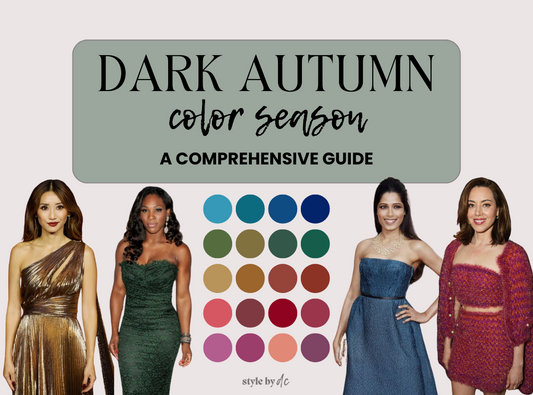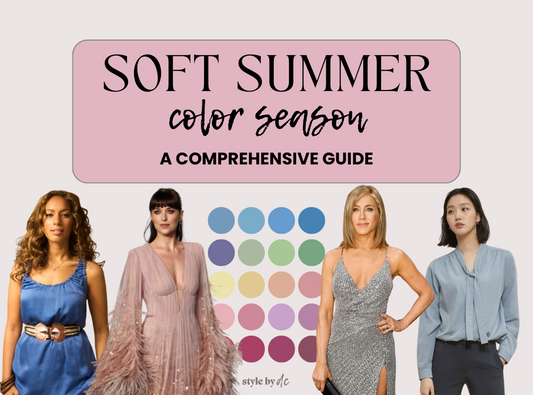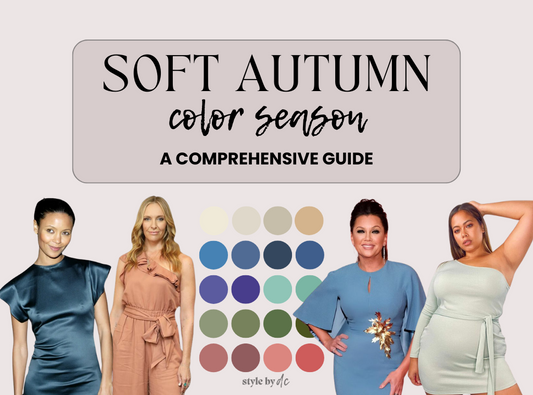Is the True Spring Color Season Your Best?
Have you ever worn cool, soft colors and felt they made you look washed out or like you didn’t have enough “oomph”? Or tried on a warm golden yellow and noticed how it made your complexion glow? If your natural coloring is warm, clear, and bright, you might be best suited to True Spring!
True Spring belongs to the 16-season color analysis system and is one of the warmest and brightest seasons, sitting between Light Spring and Warm Spring. This guide will help you determine if the True Spring palette is your best, which colors suit you best, and how to style your palette effortlessly.

How to Know If the True Spring Palette is for You
A True Spring has warm undertones, medium-to-light depth, and a high level of clarity. If you resonate with the following characteristics, this may be your best season!
Key Characteristics
While characteristics don’t fully determine which of the 16-season color palettes may be your best, they can give clues that help narrow it down. If you have any of the following characteristics (you don’t have to have them all!), the True Spring palette may be the best for you:
|
Skin Tone |
Warm undertones with a golden or peachy tint Skin may range from fair to deep, but always leans warm Tans easily and often develops a golden glow |
|
Hair Color |
Golden blonde, warm brown, or light auburn Hair naturally has golden or honey tones, with no ashiness |
|
Eye Color |
Clear blue, warm green, golden brown, or light hazel Eyes often have a bright, sparkling appearance |

✅ Quick Color Analysis Quiz: Is True Spring Your Best Palette?
Answer YES if you…
✔ Glow in warm corals, golden yellows, or clear greens, but look washed out in cool grays or icy blues
✔ Look best in gold jewelry over silver
✔ Have a high level of contrast between your features, with bright, warm tones
Want to take the full Seasonal Color Analysis Quiz? Get yours below:
True Spring Palette Characteristics
With seasonal color analysis, there are generally 12 seasons, while some use the 16-season color analysis system. Each season sits on a spectrum of color, and the palette will usually have characteristics to match. When looking at the seasons, we consider three main color dimensions: Hue, Chroma, and Value.
Hue
This is how warm or cool a color is—also known as its temperature. The True Spring palette is fully warm, sitting at the warmest end of the spectrum. Most colors in this palette have a yellow or golden undertone, with no cool, blue undertones. The palette includes warm yellows, golden oranges, bright greens, and clear corals.Even traditionally cooler colors like blue have a warm tint, creating teal and turquoise shades.
Chroma
This is how saturated or soft a color is. True Spring colors are bright and clear, meaning they are highly saturated and have no gray or muted tones. The colors in this palette are lively, vibrant, and full of warmth.Compared to True Autumn, which is also warm but more muted, True Spring is sharper and more intense.
Value
This is how light or dark a color is. True Spring leans medium-light, meaning the colors have more white than black added to them.While the palette does have some deeper shades, most of the colors are light to medium in depth.This makes True Spring brighter and lighter than its deeper sister palette, Warm Spring.

The True Spring Color Palette
The True Spring palette is warm, bright, and clear, inspired by sunlit fields, fresh blooms, and the lively vibrancy of springtime landscapes. This gives it an uplifting and energetic feel, but you can control the mood of the palette by how you style it (more later on in this post…)
|
Best Shades |
How to Wear Them |
|
Warm Coral |
A coral blouse with cream trousers |
|
Golden Yellow |
A golden yellow dress for a radiant look |
|
Bright Green |
A bright green cardigan for a pop of color |
|
Turquoise |
A turquoise scarf for a lively accent |
|
Warm Beige |
A beige trench coat for layering |
These are examples of standout colors in the True Spring palette, but there are many more, including other shades of yellow, orange, red, and even soft purples and blues.

Download the True Spring Digital Palette here:
Colors to Avoid for True Springs
These are colors with opposing color dimensions to the True Spring palette. If this palette suits you best, wearing colors that are too cool, dark, or muted can make you look ashy, dull, or overwhelmed.
|
Avoid These Colors |
Choose These Instead |
|
Cool Gray |
Warm Sand |
|
Icy Blue |
Warm Teal |
|
Deep Burgundy |
Bright Raspberry |
|
Black |
Rich Chocolate Brown |

Sister Palettes
You’ve probably heard the term Sister Palettes in seasonal color analysis but if not - it basically means the color palettes that share some of the similar color dimensions / characteristics. Because these palettes are not far off on the color spectrum, it makes sense in color theory that they could also suit you.
For True Spring which is warm, bright and light - its sister palettes are Bright Spring and Light Spring. Bright Spring leans warm but also contains some cool colors as it’s on the cusp of the temperature scale. It’s more bright or clear than True Spring meaning that the colors appear more vibrant or bright (even neon). It also has more of a mix of warm and cool colors, as it’s close to Bright Winter (a cool leaning season) on the seasonal color wheel. Moving more towards the light end of the spectrum is Light Spring which also leans warm but contains some cooler colors. It is lighter than True Spring meaning the colors are almost more pastel looking with white added.
If True Spring is your best palette, usually you’ll suit the less bright colors from the Bright Spring palette and the more saturated colors from the Light Spring palette.
The only exception is if your main characteristic is warmth but you aren’t super bright or super light - but somewhere in the middle. This is where the 16 season color analysis system comes in handy as there is a True Warm palette that sits in between True Spring and True Autumn.

Styling Your True Spring Palette
A True Spring wardrobe can feel vibrant, fresh, and full of movement. While it is often associated with youthful, playful, and energetic styles, you can tailor it to match different aesthetics, from preppy to vintage to modern minimalist. This palette tends to give a fun punch of color to any aesthetic but if that’s not your thing, you can always opt for the deeper colors in the palette for a more moody vibe. Don’t let the bright colors fool you - you can still make this palette look refined with the right styling!
✅ Best Outfit Combinations
🌞 Casual: A bright coral t-shirt paired with light beige trousers and golden sandals for a relaxed, sunny look.
💼 Workwear: A golden yellow blouse tucked into a warm beige pencil skirt, complemented by a turquoise blazer and nude pumps.
🌸 Evening: A vibrant green dress accessorized with gold jewelry and a coral clutch for a lively, polished finish.

Hair & Makeup for True Springs
When considering hair and makeup for True Spring, think of golden warmth, fresh peach tones, and bright, clear hues. While the usual vibe associated with Spring is very colorful and lively - the colors in this palette can be adapted to any type of makeup look, from a simple fresh neutral look to a bold, colorful or playful look.
|
Feature |
Best Shades |
|
Lipstick |
Coral, Peach, Warm Red |
|
Blush |
Warm Peach, Apricot, Soft Coral |
|
Eyeshadow |
Golden Brown, Soft Green, Warm Beige |
|
Jewelry/Metals |
Gold, Bronze, Rose Gold |
Hair
When looking at hair color, your natural shade is usually your best! But I know we all crave change (and possibly highlights) sometimes. Those that suit the True Spring palette should lean towards shades that have a light and golden base to them which keeps the color warm. You’re in luck if Spring is your season - as many hair dyes add a golden hue when lightened. Springs can also add vibrancy to their look with a color gloss or bright and warm highlights.

FAQ: Everything You Need to Know About True Spring
Q: Can True Springs wear black? A: Black is generally too harsh for True Springs. A softer alternative is warm chocolate brown or warm navy.
Q: What’s the difference between True Spring and True Autumn? A: True Spring is warm, bright, and clear, while True Autumn is warm, deep, and muted.
Q: How do I know if True Summer or True Spring is my best season? This is a common struggle, especially for those that have light hair and eyes! A good quick test you can do is compare a bright pink and a softer, more muted pink. Or compare brown or grey. If you’re still having a hard time deciding, I’d recommend a professional color analysis using the 16 season system. It is very possible that you are between seasons!
Still not sure? Take the Color Analysis quiz to narrow down which sub season may be for you!
Final Thoughts: Embrace Your True Spring Beauty
Understanding your seasonal color palette allows you to build a wardrobe, makeup routine, and style that enhances your features naturally. If the True Spring palette resonates with you, start embracing warm, bright hues today!
Book a Personal Virtual Color Analysis to Confirm Your Season



